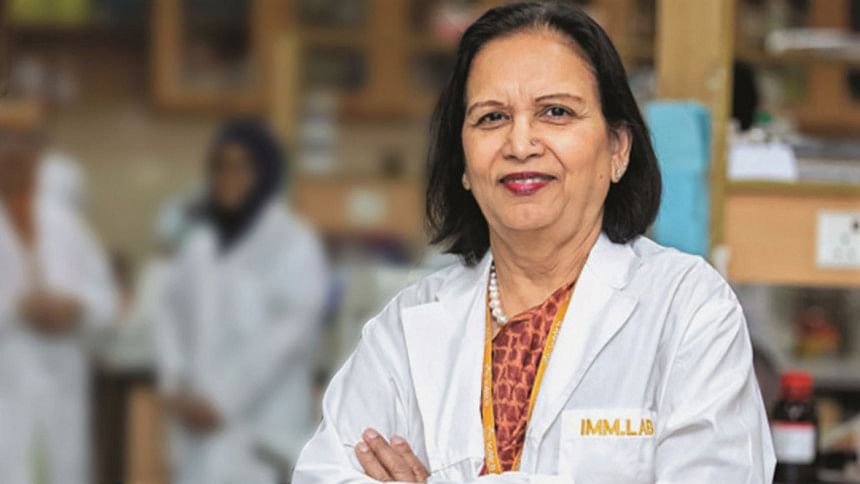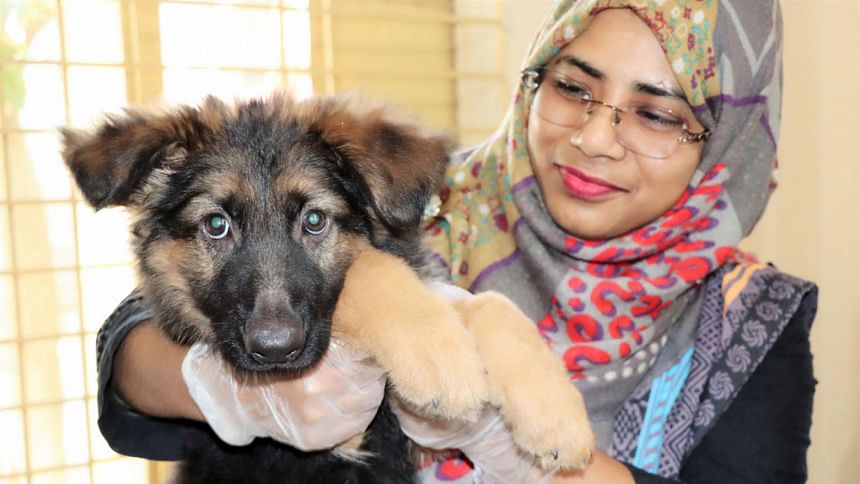Celebrating women in STEM

The key to progress has always been science. It has led to the modern world we see today, and yet women are deprived from this field of study. They have been belittled and pushed aside for so long that many still consider science and technology to be a male centric interest. But today, we are focusing on women who triumphed against all odds and have changed the world for the better.

Dr Firdausi Qadri is possibly one of the most highly decorated Bangladeshi women in STEM. She's an emeritus scientist and the senior director for the Infectious Diseases Division at the International Centre for Diarrhoeal Disease Research (icddr,b). She's has over 25 years of experience developing cholera vaccines and studying the immune responses of people with infectious diseases.
She's also a recipient of the "Christophe Merieux Prize" in 2012. She earned a 500,000 euros as the prize money. With this money, she started her own research institute named "ideSHi". In 2020, she won the L'Oreal-Unesco for Women in Science Awards for the Asia-Pacific region for her contribution to understanding and preventing infectious. She also won a 100,000 euro cash prize which she used to expand ideSHi operations even further.
In 2021, Dr Firdausi Qadri, was honoured with the Ramon Magsaysay Award.

Salma Sultana is a veterinarian, entrepreneur, researcher and recipient of the 2020 Norman Borlaug Award. She is also listed in the top 100 Asian Scientists list for her innovative model of providing veterinary outreach, treatment, and education to thousands of farmers in Bangladesh.
In 2014, she started an outdoor veterinary hospital named Model Livestock Institute Veterinary Hospital, which is engaged with treatment and services for domestic animals. In 2018, she started VetSheba, a call centre and online service that allows farmers to directly connect with a doctor or expert consultant. She's also the founder of the Model Livestock Advancement Foundation, a non-profit organization that focus on animal healthcare, women empowerment, food security and safety.

Dr Samia Subrina is a professor of Electrical and Electronic Engineering (EEE) at the Bangladesh University of Engineering Technology (BUET). Dr Subrina's research focuses on nanotechnology, modelling thermal transport of nanomaterials, modelling and characterising the electronic properties of nanomaterials, device and material characterisation as well as renewable energy.
Nanotechnology is a new and exciting field of study. It's certainly one of the lesser known scientific fields in Bangladesh. But that only motivated Dr Subrina to pursue nanotechnology even further. She won the 2020 OWSD-Elsevier Foundation Award for Early-Career Women Scientists in the Developing World, for her research on the properties and uses of nanomaterials. She was also placed in the 6th edition of the Asian Scientist 100 list.
Dr Jennifer Doudna is easily one of the greatest scientists alive today. She's currently a Professor of Biochemistry at UC Berkeley. But she also happens to be a Nobel Laureate. Jennifer Doudna, along with Emmanuelle Charpentier, shared the 2020 Nobel Prize in Chemistry for their co-development of CRISPR-Cas9, a revolutionary gene-editing tool that allows scientists to rewrite DNA.
Her discovery of CRISPR-Cas9 (bacterial enzymes that control microbial immunity) is considered one of the most important discoveries in the history of biology. She's been named one of the Time 100 most influential people in 2015 and she was listed as a runner –up for Time Person of the Year in 2016. She's also a recipient of several prestigious awards and fellowships including the Alan T. Waterman Award (2000), the Canada Gairdner International Award (2016), and the Japan Prize (2017).
Dr Nina Tandon is a biomedical engineer who is changing the world of cell science. She's also the founder and CEO of EpiBone, a company that develops technology to create bone tissue for skeletal reconstruction. This allows practitioners to replace defective bones with healthy bone tissue that was grown in a lab using the patient's stem cells.
Dr Tandon has also utilised a similar method for growing rat hearts in a laboratory settings. In the future, she hopes to figure out a way for scientists to create healthy human organs. Something this cutting edge would forever change the healthcare industry. In 2011, she was named a TED Fellow and in the following year, she was named a senior TED Fellow. She's also a recipient of the Marie Clare's Women on Top Award in 2013 and she's been named as a 2015 Global Thinker by Foreign Policy.

 For all latest news, follow The Daily Star's Google News channel.
For all latest news, follow The Daily Star's Google News channel. 








Comments